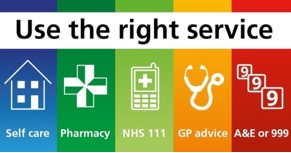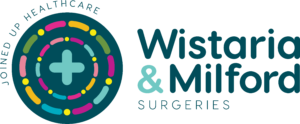What to do when the surgery is closed
We have many patients contacting us on Mondays who have had concerns over the weekend and have “waited until after the weekend” before making contact with us. Even though GP practices, hospitals and NHS service are very busy we would still urge you to make contact if you are worried.

A&E or 999 You should always call 999 if someone is seriously ill or injured, or their life is at risk.
Examples of medical emergencies include (but are not limited to):
- Cardiac arrest/ collapse/ unconsciousness
- Chest pain / heart attack
- Convulsions / fitting
- Stroke symptoms
- Traumatic / serious injury
- Severe burns / scalds
- Choking
- Drowning
- Severe allergic reactions
NHS 111 is available 24 hours a day, 7 days a week.
You can call 111 if you require medical advice.
Go to 111.nhs.uk (for people aged 5 and over only) OR call 111
You will be asked questions about your symptoms on the website, or by speaking to a fully trained adviser on the phone. You can ask for a translator if you need one.
Depending on the situation you will:
- find out what local service can help you
- be connected to a nurse, emergency dentist, pharmacist or GP
- get a face-to-face appointment if you need one
- be told how to get any medicine you need
- get self-care advice
Lymington New Forest Hospital Urgent Treatment Centre (UTC)
Wellworthy Road, Lymington SO41 8QD
The UTC is open 7 days a week 8am – 9pm for walk-in and pre-bookable appointments.For more information, please read their patient information leaflet below.
The team of nurses, healthcare assistants and paramedics have further support by having a General Practitioner in the unit. Patients have access to diagnostic facilities such as x-ray. Patients may want to seek advice from their pharmacist, GP or 111 first, to help determine whether they require immediate healthcare intervention.
This service is for patients with:
- urgent minor illness which is new i.e., it’s not a long-term condition or illness which the patient has been suffering with for more than a couple of days.
- urgent minor injury such as sprains, broken bones, bites or stings.
- patients needing assessment and treatment of wounds.
- Following an initial clinical assessment, you may be re-directed to another service which is more appropriate to your needs i.e., pharmacist, your GP practice, A&E or a community service.
Please note that the UTC is unable to deal with medical emergencies such as traumatic injuries, chest pain, and suspected strokes – please call 999 and seek advice if you think there is a chance that your situation is a medical emergency.
Using your local pharmacist
Pharmacists are experts in medicines who can help you with minor health concerns. You can use the link below to find your nearest pharmacy.
https://www.nhs.uk/service-search/find-a-pharmacy
As qualified healthcare professionals, they can offer clinical advice and over-the-counter medicines for a range of minor illnesses, such as coughs, colds, sore throats, tummy trouble and aches and pains. All pharmacists train for 5 years in the use of medicines. They are also trained in managing minor illnesses and providing health and wellbeing advice.
If symptoms suggest it’s something more serious, the pharmacist will tell you if you need to see a GP, nurse or other healthcare professional.
Many pharmacies are open until late and at weekends. You do not need an appointment. Most pharmacies have a private consultation room where you can discuss issues with pharmacy staff without being overheard.
